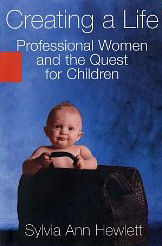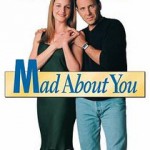 By Jae-Ha Kim
By Jae-Ha Kim
Chicago Sun-Times
March 17, 1997
When you’re a 20-year-old coed, you can barely hear your biological clock ticking.
At that age, most young adults worry about summer jobs, graduating and trying not to get pregnant.
But Sylvia Ann Hewlett’s book Creating a Life: Professional Women and the Quest for Children (Talk Miramax, $22) warns women of all ages that having babies must be timed at least as carefully as career choices.
This book has evoked a range of emotions from women in their 30s and 40s who believed they had plenty of time to start a family. From “The Oprah Winfrey Show” and Glamour to “The View,” no constituency of women has gone unaffected by what appears to them as new information. Had they known 20 years ago what we do now about a woman’s physiology, would they really have made different choices?
We presented the information in Hewlett’s book to five students, Emily Kay, 18, and Malika Anand, 19, from the University of Chicago; Vickie Cook, 20, and Laura Millendorf, 21, from Northwestern University; and Casey Plasch, 19, from DePaul University.
Smart, savvy and optimistic, each had a working mother as a role model. Four of them optimistically believe they will be able to balance careers with children. The fifth is sticking to a decision she made when she was 6 to stay single–and childless.
Has Hewlett’s book made you plan for having children sooner rather than later?
Anand: When I think about my life, it’s always in terms of career choices, what I’m going to study, what school I’m going to next. Getting married and having a family isn’t something I think about or put effort into planning. It seems like it’ll happen.
Kay: A lot of our [dorm] resident heads are 25 and have kids. It seems like so much work. One of them is always telling us all this stuff about babies, and I really don’t want to do all that now.
Anand: Getting a Ph.D. is easier than raising children.
Cook: Since I want to get a Ph.D., I’m not even thinking about having kids before I’m 30.
Plasch: I don’t plan on ever getting married or having children. It really doesn’t fit in with what I want to do.
The more a woman succeeds in her career, Hewlett writes, the less likely she will have a partner or a baby. How does this translate on the collegiate level?
Anand: Being a woman in college who’s vocal and opinionated, you cut your dating pool down a lot. Our school may be 50 percent male, but there’s a large population that doesn’t want a woman who’s really independent and smart. As much as guys like to say they’re not intimidated by strong, intelligent women, that’s false.
Plasch: I’m in business classes with all these guys who come in with their suits on. The minute a girl raises her hand to answer a question, they’re totally intimidated. I also work as a cocktail waitress and all of a sudden it’s totally different–they see me as the most likable person in the whole world. Sometimes it’s the same guys, too. They’re more comfortable with me as the waitress than as a business student because I’m serving them and they don’t see me as a threat.
When do you want to have your first baby?
Kay: My mom’s an OB/GYN and she works with high-risk pregnancies. She delivers babies for women 40 and older. She had me when she was 30 and my sister when she was 34. I want to get started on my career and live it up while I’m younger. Then maybe when I’m 28, I’ll get married and have my first child between 30 and 33. I don’t think that’s too late.
Anand: I can’t imagine myself leading a stable life until I’m at least 30. Babies will be after that. My mother’s friends have daughters who all have stable jobs and are 30. Once you have a stable job, it’s harder to meet people, so all their mothers are freaking out. My family doesn’t put pressure on me about babies. It’s all about school. My dad has two master’s degrees, and my mother now is working on her third master’s. If I have boy problems, they’re really dismissive about them.
Millendorf: Maybe when I’m 26 or 27. My mother had me when she was one year out of med school and she was working 100-hour weeks. Although that was the hardest time of her life, she still thinks you should have kids younger ’cause that’s when you have the most energy. It’s going to be a challenge balancing a young child at home and your career whether you’re 28 or 35, so you may as well do it when you’re younger and your body hasn’t deteriorated.
Would you consider having your eggs or embryos frozen now just in case you don’t end up starting a family until it’s “too late”?
Cook: I don’t care if my kids are biologically mine. There are so many kids all over the world who aren’t wanted at all. If it works out that I can’t make time to have a kid until I’m 35 or 40, I’ll adopt.
Millendorf: I would consider it because I really want to have a family. Why not take advantage of technology?
Plasch: You should never use biology as a reason to have kids.
Anand: I can’t imagine doing that. It seems really desperate.
Kay: I do want to have a family and would like to do it before 40, so I hopefully won’t have to freeze my eggs.
Hewlett encourages women to seek family-friendly employers: Is this something you worry about? Kay: No. My mom worked at the hospital and she always had day-care people for us, or we would stay with other women who were stay-at-home moms. I turned out all right.
Millendorf: You can’t ask at a job interview if they’re family-oriented or they won’t hire you. I would rather go for my career goals and sacrifice a completely family-friendly environment because I’m expecting whoever I’m with to be sharing the work with me at home. I don’t buy the whole idea that you have to be home at a certain time to make sure that youand not the nanny or baby-sitter are the one to put them down for their naps. There’s no evidence that a 1-1/2-year-old raised by a stay-at-home mom is more developed than a child raised in day care.
Cook: It’s going to be another 10 years before I think about starting a family. Hopefully most of the work places will have child-care facilities by then.
Would you consider having kids right out of college, then working on your career in your 30s or 40s? Kay: I don’t ever want to be a stay-at-home mom. I couldn’t handle it at all. Starting later would make it more difficult for me to get what I wanted done. Ideally I’d be able to switch jobs a couple times so I’m not stuck doing one thing. A lot of women don’t end up going back [to work]. I know a woman who had a college degree, had two children and now 18 years later is trying to find a job. She’s not finding what she wants and unfortunately isn’t as valuable in the work force anymore.
Millendorf: I grew up in a household where I was taught that women who have an education and aren’t using it are wasting it. I don’t look down on women who choose to stay at home or start their careers later. But you can’t leave the work force for three years and expect to come back to whatever career path you were on before. It just doesn’t work that way.
______________________________________
Behold! Women in the eye of the media May 19-21, 2002
If media–TV, movies, music, books and such–reflect societal mores and attitudes, take a look at the state of women throughout the years.
1951: Lucille Ball sets a TV precedent by working her real-life pregnancy into “I Love Lucy.” Playing a homemaker who wants to work, Lucy constantly schemes to perform in her husband’s nightclub. Ricky resists. He even spanked her.1955: On “The Honeymooners,” the middle-age Kramdens have been married for 15 years and never had a baby. No one makes Alice feel guilty about it, either.
1956: Women swoon over ‘”Love and Marriage,” sung by Frank Sinatra.
1958: Donna Reed sets the standard for ’50s stay-at-home moms on “The Donna Reed Show.”
1964: Samantha on “Bewitched” has skills–of the witchcraft kind. Her hubby orders her to give up witchcraft, which in essence is her job. She concedes but uses magic part time.
1964: ”You Don’t Own Me,” by Leslie Gore strikes the right chord with women.
1968: Diahann Carroll breaks barriers on “Julia” as a gorgeous African-American single mom who looks like a model, works full time as a nurse and still manages to keep her house spotless.
1969: News producer Mary Richards was the epitome of the modern working woman on “The Mary Tyler Moore Show.” Never mind that she spent more time typing, making coffee and crying than making production decisions. She was a single woman whose career came first.
1969: A widowed couple meet, marry and co-exist with their large brood on “The Brady Bunch.” With the aid of ever-faithful housekeeper Alice, Carol Brady manages to keep her husband, six kids and dog in line.
1972: Gloria Steinem founds Ms. Magazine. One of the world’s most recognizable feminists, Steinem is both applauded and blamed for telling women they can have it all. Steinem, who never had children, surprises many by marrying David Bale in 2000.
1974: Esther Rolle plays the hard-working matriarch of a family living in a Chicago housing project in “Good Times.” Her husband is a strong disciplinarian, but it’s her wisdom that keeps the children in line.
1975: Bonnie Franklin is a feminist, divorced mother of headstrong teenage girls on “One Day at a Time.” The show tackles teenage pregnancy, birth control and drugs.
1976: Sabrina, Kelly and Jill are more interested in catching the bad guy than in landing Mr. Right on “Charlie’s Angels.”
1983: A woman persuades her husband to impregnate their childless friend in “The Big Chill.”
1984: A pair of divorced moms move in together on “Kate and Allie.” Kate takes the traditional man’s role as the primary breadwinner, while Allie stays home to cook and rear the kids.
1984: Claire Huxtable is the ultimate Super Mom on “The Cosby Show.” An attorney, she also cooks the family meals and keeps the family brownstone impeccable sans maid.
1986: “The Oprah Winfrey Show” goes into syndication. The popular daytime talk show host skipped having children to build her media empire.1987: In “Baby Boom,” Diane Keaton is a high-powered executive whose career is threatened when she inherits a baby. She realizes she can’t do it all, quits her job and starts her own business, which fortuitously proves to be even more successful than her previous job.
1987: Holly Hunter wants a baby so much in “Raising Arizona” she persuades her husband to kidnap one.
1988: “Roseanne” depicts a blue-collar family with latchkey kids. The parents struggle to get their bills paid and keep their children from making the same mistakes they did–getting married and starting a family right out of high school. Sister Jackie opts for single parenthood.
1985: People foot-stomp and toe-tap to ”Sisters Are Doing It For Themselves” by the Eurythmics and Aretha Franklin.
1992: “Murphy Brown” gets Dan Quayle’s dander up when she decides to have a baby out of wedlock.
1993: The ladies of “Living Single” pursue their passions–work, money and men. Kadijah, played by Queen Latifah, puts her all into publishing her mag, Flava. Sexually liberated Max embodies the image of the predator careerist.
1999: Sela Ward plays a divorced mom trying to regain her identity in “Once and Again.” Just as she begins to create a niche for herself with her own radio show, her new husband expects her to give it all up to move to Australia with him for his new job.
1999: Cher persuades everyone to “Believe.”
2000: Helen Fielding’s novel Bridget Jones’s Diary chronicles the life of a desperate singleton who smokes and drinks too much, and longs to be married. Real women relate to the universal tale of a 30ish career gal who wants it all but doesn’t get it all.
2000: No Doubt’s Gwen Stefani–everyone’s favorite gurrl–just wants “a simple man/so I could be a wife.”
2001: Despite its sassy title, “Sex and The City” deals with serious issues in a comical way. Charlotte undergoes fertility treatments and is told bluntly by her doctor it’s all downhill for women over 35. Miranda gets pregnant and decides to have the baby alone.
2002: Calista Flockhart is a neurotic attorney with a trail of failed relationships and visions of a dancing baby on “Ally McBeal.” In her younger years, she had her eggs frozen just in case. They accidentally fertilized one, and she ends up becoming a mom to a child she never knew she had.
2002: This season, the married sisters on “Charmed” have worried about how to balance future children with their work–saving the world from evil.





The Chicago Sun-Times features staff worked on a series regarding this issue. As a team, we won the Peter Lisagor Award for outstanding journalism and research.